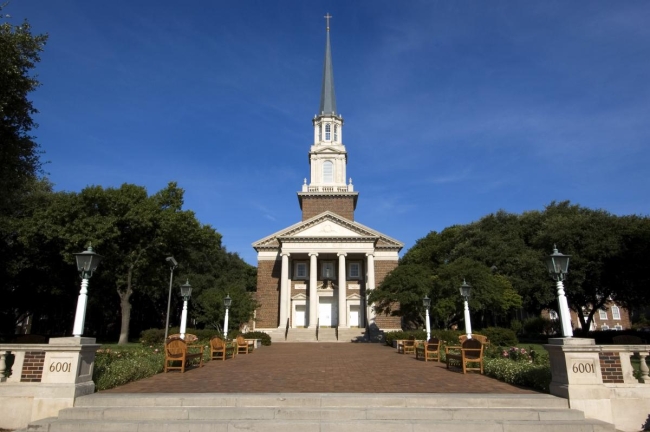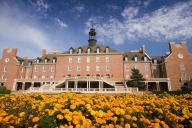You have /5 articles left.
Sign up for a free account or log in.

Southern Methodist University's Perkins Chapel
Southern Methodist University
A regional branch of the United Methodist Church filed suit against Southern Methodist University for amending its governance documents to separate itself from control by the church.
According to the lawsuit, filed last week in the court of Dallas County, Southern Methodist filed an amendment to its articles of incorporation in November deleting language stating that SMU was “to be forever owned, maintained and controlled by the South Central Jurisdictional Conference of The United Methodist Church.”
The decision by SMU to amend its article of incorporation and bylaws follows a February vote by the Methodist church’s controlling body to strengthen its prohibitions on performing same-sex marriage and ordaining gay and lesbian clergy. SMU’s president, R. Gerald Turner, responded to the vote by reaffirming the university’s nondiscrimination policies and inclusive values and emphasizing the institution’s independence from church governance.
The Board of Trustees voted in November to "update its governance documents to make it clear that SMU is solely maintained and controlled by its board as the ultimate authority for the university," Turner wrote in a statement Friday.
In the lawsuit, which was first reported on by the Methodist publication UM News, the South Central Jurisdictional Conference of the United Methodist Church, or SCJC, states that the lawsuit was necessitated by what it describes as “recent, unauthorized acts by representatives of SMU in Violation of SCJC’s rights and interests in relationship between SMU and SCJC that has existed for more than century.”
SCJC claims that it founded SMU in 1911 with an initial gift of 133 acres of land. “For more than a century, SMU and its governing documents have acknowledged that SCJC is the electing, controlling, and parental body of SMU,” the complaint states.
The Methodist conference argues that SMU's governance documents permanently grant the church body “many valuable rights,” including rights to appoint SMU trustees, to approve all trustees prior to their appointments, to terminate any trustees for cause, to veto any efforts to sell real estate and -- the issue at the heart of this case -- to block any amendments to SMU's articles of incorporation that are not first approved and authorized by the SCJC.
“Put simply, the trustees of SMU had and have no authority to amend the Articles of Incorporation without the prior approval and authorization of SCJC,” the lawsuit states. “Because the Trustees’ acts were neither approved nor authorized by SCJC, the resulting November 2019 Articles are void from their inception.”
In his Friday statement SMU President Turner said he is confident "that our board’s actions are in compliance with Texas law."
"With Methodist in our name, the Perkins School of Theology as a resource, and assurance of Methodist representation on the Board of Trustees, the Church will continue to have important influence in the governance of SMU," Turner said. "Nothing changes in SMU’s day-to-day operations because of these actions."
A SMU spokeswoman, Dianne Anderson, said that the university's amended bylaws now provide for seven out of the 42 trustees to be nominated in consultation with the College of Bishops, with that number including one bishop from the United Methodists or a successor denomination.
Amy White Ezell, a spokeswoman for SCJC, said the conference's goal is a "highly principled judicial declaration that SCJC and SMU retain the relationship and all rights they have enjoyed for more than a century."
Several other Methodist colleges have moved to separate themselves from the United Methodist Church following the February vote opposing same-sex marriage and ordination of same-sex clergy. The boards of Baldwin Wallace University and the University of Mount Union, both in Ohio, respectively voted last spring to end universities’ formal affiliations with the church. The chair of Baldwin Wallace’s board, Charles Rotuno, said at the time of the April vote that while the board valued the relationship the university had with the church, its members “concluded that becoming an independent university will allow the BW community to continue to fully embrace and embody the values of diversity and inclusion today and always.”








